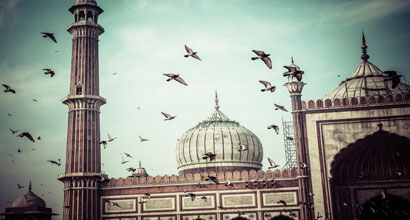
The individual and the community that observe the prayer are centers of enlightenment, human reform and uprightness.
EDC Staff
Prayer is one of the five pillars of Islam and the first act that a person will be held accountable for on the Day of Resurrection. If it is approved, any other act would be so and if not,, any other act would be disapproved. Prayer is the best and most significant deed for those who seek closeness to the Almighty Allah.
In a Qudsi hadith, the Prophet (peace be upon him) said that the Allah says: “I have divided the prayer into two halves between Me and My servant, and My servant will receive what he asks. When the servant says: Praise be to Allah, the Lord of the universe, Allah the Most High says: My servant has praised Me. And when he (the servant) says: The Most Compassionate, the Merciful, Allah the Most High says: My servant has lauded Me. And when he (the servant) says: Master of the Day of Judgment, He remarks: My servant has glorified Me. And sometimes He would say: My servant entrusted (his affairs) to Me. And when he (the worshipper) says: You do we worship and of You do we ask help, He (Allah) says: This is between Me and My servant, and My servant will receive what he asks for. Then, when he (the worshipper) says: Guide us to the straight path, the path of those to whom you has been Gracious, not of those who have incurred your displeasure, nor of those who have gone astray, He (Allah) says: This is for My servant, and My servant will receive what he asks for.” (Muslim)
No wonder that the Qur’an has mentioned that “keeping prayer up” as the first and last attribute of the believers. The Qur’an reads in Surat Al-Mu’minun (the 23rd Chapter of the Qur’an):
Certainly will the believers have succeeded. They who are during their prayer humbly submissive. (Al-Mu’minun 23:1-2)
And ends this attributes with His saying:
And they who carefully maintain their prayers. (Al-Mu’minun 23:9)
This is a clear indication to the status of Prayer in the life of the individual and the Muslims community in general.
There is a misconception among people that prayer and other religious rites just represent a mere spiritual relationship between the slave and His Creator. This is relationship is irrelevant to the individual, and the society’s affairs, economic, social, and political affairs. This is what the enemies of Islam want to convince us with, to keep prayer out of its proper context. In this way, the prayer would become mere physical movements offered without consciousness or devotion to the Almighty Allah, which makes it useless in the life of the Muslims and the community in general.
The impact of prayer is not limited to the place of prayer (mosque), but exceeds it to the different fields of the society to maintain the social life as the Almighty Allah commands. Therefore, the prayer, in its educational and social sides, urges people to help each other and feed the poor. The Almighty Allah says:
Have you seen the one who denies the Recompense? For that is the one who drives away the orphan. And does not encourage the feeding of the poor. So woe to those who pray [But] who are heedless of their prayer. Those who make show [of their deeds]And withhold [simple] assistance. (Al-Ma`un 107)
Therefore, the praying person always abides by the Islamic morals while dealing with others. He is supposed to avoid insults, lies, backbiting, or saying something evil to others. Instead, he is required to spread goodness and virtues among people. Also, prayer has been linked with restraining one’s hand from injustice and aggression. The Almighty Allah says:
Have you not seen those who were told, “Restrain your hands [from fighting] and establish prayer… (An-Nisaa’ 4:77)
The Muslim, during his prayer, always remembers Allah, His commands and prohibitions. We read in the Qur’an:
establish prayer for My remembrance. (Ta-Ha 20:14)
In this way, crimes would be prevented, and peace would prevaile in the society. So Islam urges Muslims to pray in congregation and ordering the lines to spread the spirit of harmony and brotherhood, and instill discipline and order among them.
In short, the effect of prayer is certainly not confined to the individual only. It encompasses a wide range of social domains, so that the life is organized and straightened according to Allah’s will.
The individual and the community that observe the prayer are centers of enlightenment, human reform and uprightness, because prayer cultivates deep the following inside man:
A. Conscious awareness through continual worshipping of Allah, fear of committing sins and shame of disobeying Him.
B. Desire to repent and turn to righteousness by continually asking Allah’s forgiveness of sins and seeking refuge with Him from committing further sins.
C. Love of good for others and keeping away from bearing grudges and egoism which are the source of evils and human misadventures in all of life is domains.
In the prayer, the worshipper asks good for all people. He or she requests for them goodness and forgiveness. Consequently, feelings of love and benevolence in their broader, general social context are encouraged.
[opic_orginalurl]


